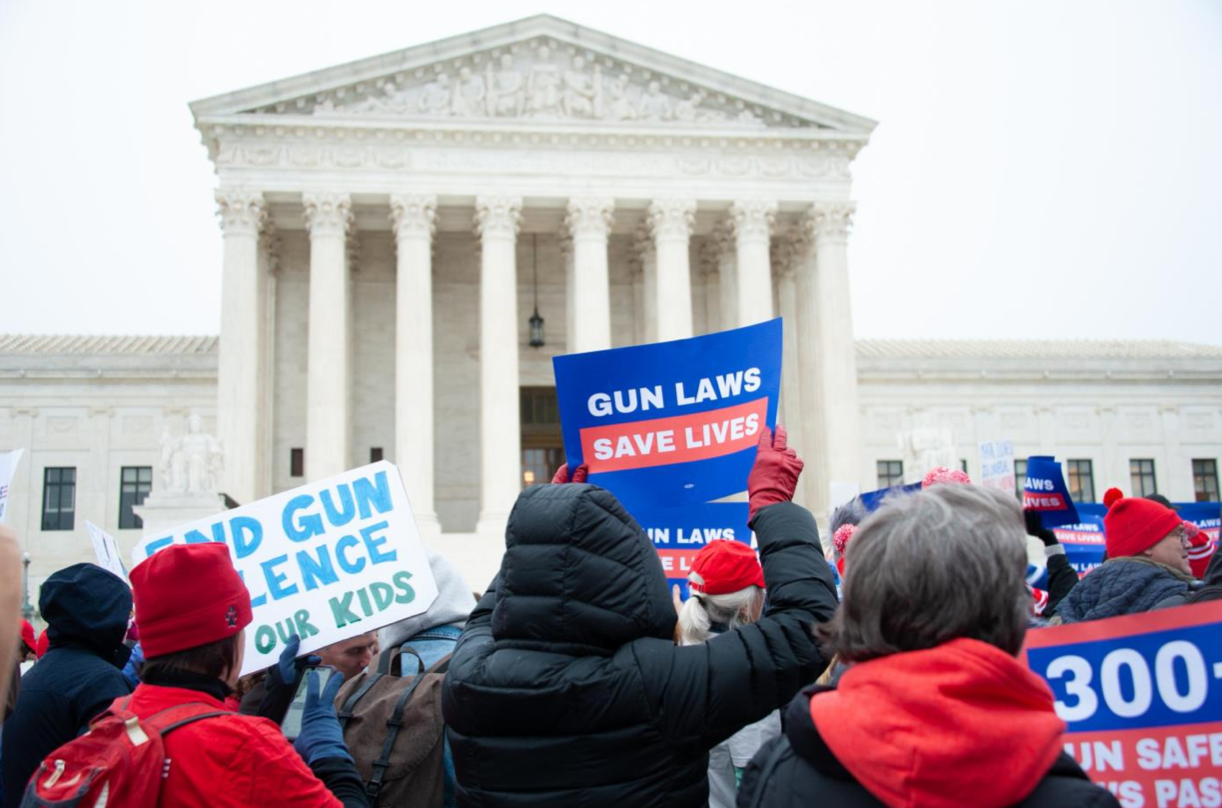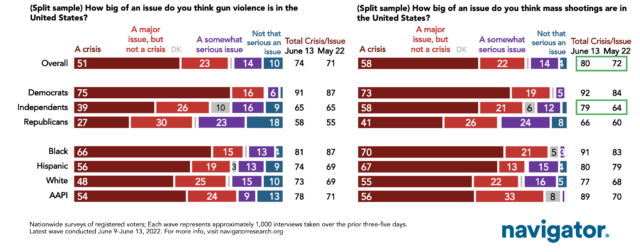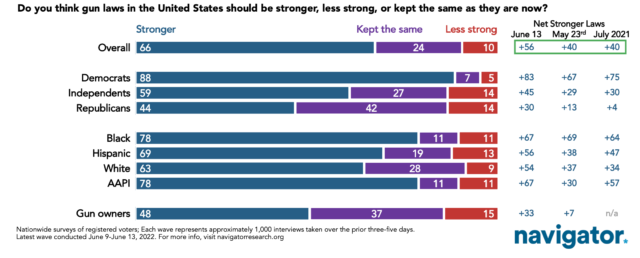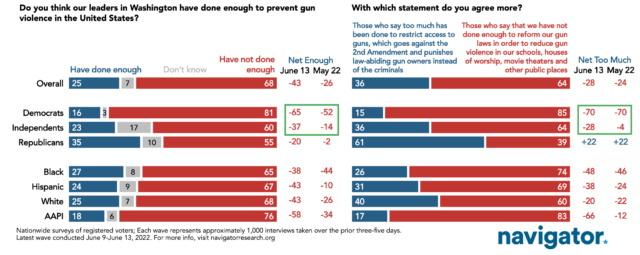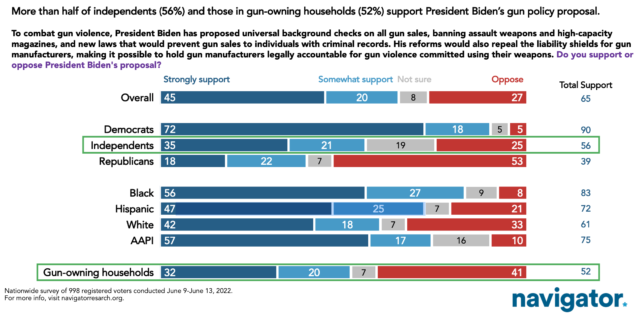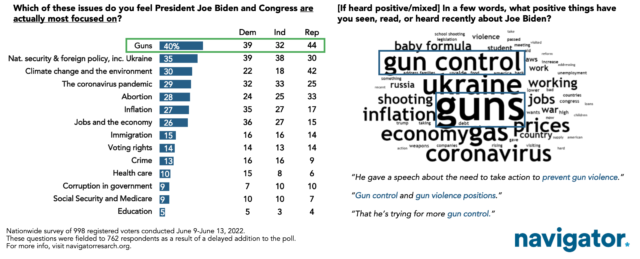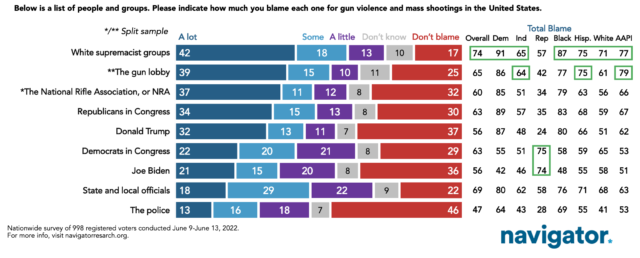- Following recent mass shootings, two in three Americans say they want stronger gun laws – the highest share reported in Navigator history.
- Majorities say Washington has not done enough to prevent gun violence.
- The most popular gun violence prevention policies include background checks, mandatory safety training, restrictions on ghost guns, and raising the minimum age of gun purchase from 18 to 21.
Americans Increasingly See Gun Violence and Mass Shootings as Crises
Since late May, there has been a 15-point increase in the share of independents who think mass shootings are “a crisis” or “major issue, but not a crisis” in the United States (from 64% to 79%).
Two in Three Americans Support Stronger Gun Laws, a Double- Digit Increase Since the Uvalde School Shooting
Since May 23rd, there has been a 16-point net increase in the share who support stronger gun laws (from +40 to +56), and the increase is bipartisan: there has been a 16-point increase among Democrats (from +67 to +83), a 16-point increase among independents (from +29 to +45), and a 17-point increase among Republicans (from +13 to +30).
Majorities Do Not Think Washington Has Done Enough on Gun Violence and Say We Have Not Done Enough to Reform
A growing share of independents agree that “our leaders in Washington have not done enough to prevent gun violence” (net -37 “have done enough,” down from net -14 in late May).
Most Popular Policies are Background Checks, Safety Training, Ghost Gun Restrictions, and Raising Minimum Age of Purchase
A range of policies have seen an increase in support since last year, including background checks and safety training.
• Among parents, the most popular policies include providing more mental health services in schools (88% support) and requiring background checks on all gun sales (84%).
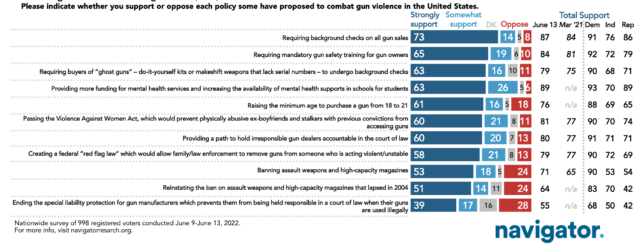
Majorities Support Biden’s Proposal on Gun Violence Prevention
More than half of independents (56%) and those in gun-owning households (52%) support President Biden’s gun policy proposal.
Two in Five Say Biden & Congress Are Focused on Guns, and on Positives on Biden, “Gun Control” and “Guns” Emerge
Two in five Democrats (39%), 32% of independents, and 44% of Republicans see Biden and Congress as focused on guns.
• Among those hearing positive things or a mix of positive and negative things about Biden, “gun control” and “guns” stand out.
White Supremacist Groups, the Gun Lobby/NRA, and GOP Are Blamed Most for Gun Violence and Mass Shootings
Democrats and independents blame white supremacist groups (91% and 65%, respectively), the gun lobby (86% and 64%), the NRA (85% and 51%), and Republican politicians the most (89% and 57%); Republicans blame Democrats (75%) and Joe Biden (74%).
Americans Prefer a Democrat Who Favors Common Sense Gun Reforms Over a Republican Who Opposes Them
Pluralities of Democrats, independents, and each racial and ethnic group prefer a Democrat who favors commonsense gun reforms and a ban on assault weapons over a Republican who opposes each.
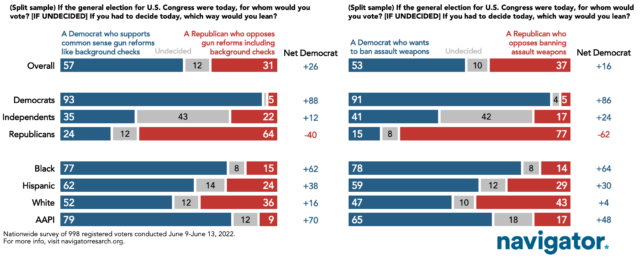
Facts on School Shootings, Child Deaths Related to Guns, and Murders Involving Firearms Most Convincing for Reform
Among the most convincing reasons to support gun reform, incidents of gunfire on school grounds (83% credible), gun murders in 2020 (80%), and the share of murders involving a firearm (80%) are seen as most credible.
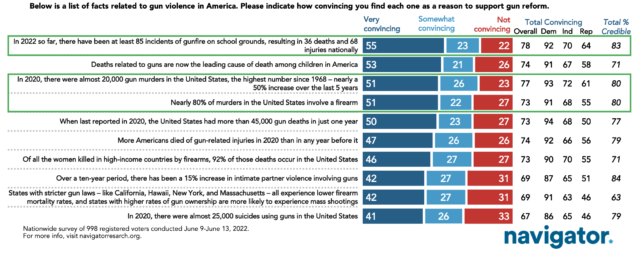
A Range of Messages About Republican Failures on Gun Violence Reform Are Concerning
Two in five Americans find each of a range of hits on Republicans for inaction on gun violence prevention “very concerning” while two in three find each hit concerning overall.
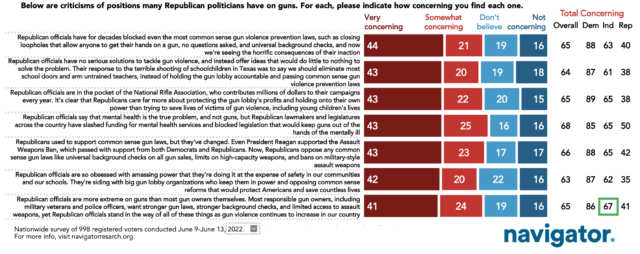
Messaging on Gun Violence Prevention and Republican Inaction Shifts Views Positively on Democrats, Negatively on Republicans
Messaging on gun violence prevention, as well as Republicans blocking gun reform legislation, increases the share who say the Democratic Party is focused on the right things from net -11 to net +10, a 21-point shift: on Republicans, it shifts perceptions 5 points into the negative (including a 15-point negative shift among Republicans).
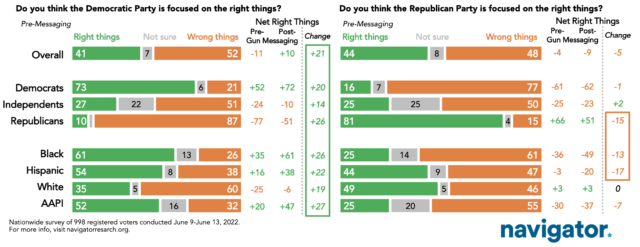
About The Study
Global Strategy Group conducted public opinion surveys among a sample of 998 registered voters from June 9-
June 13, 2022. 106 additional interviews were conducted among Hispanic voters. 80 additional interviews were
conducted among Asian American and Pacific Islander voters. 102 additional interviews were conducted among
African American voters. 101 additional interviews were conducted among independent voters.
